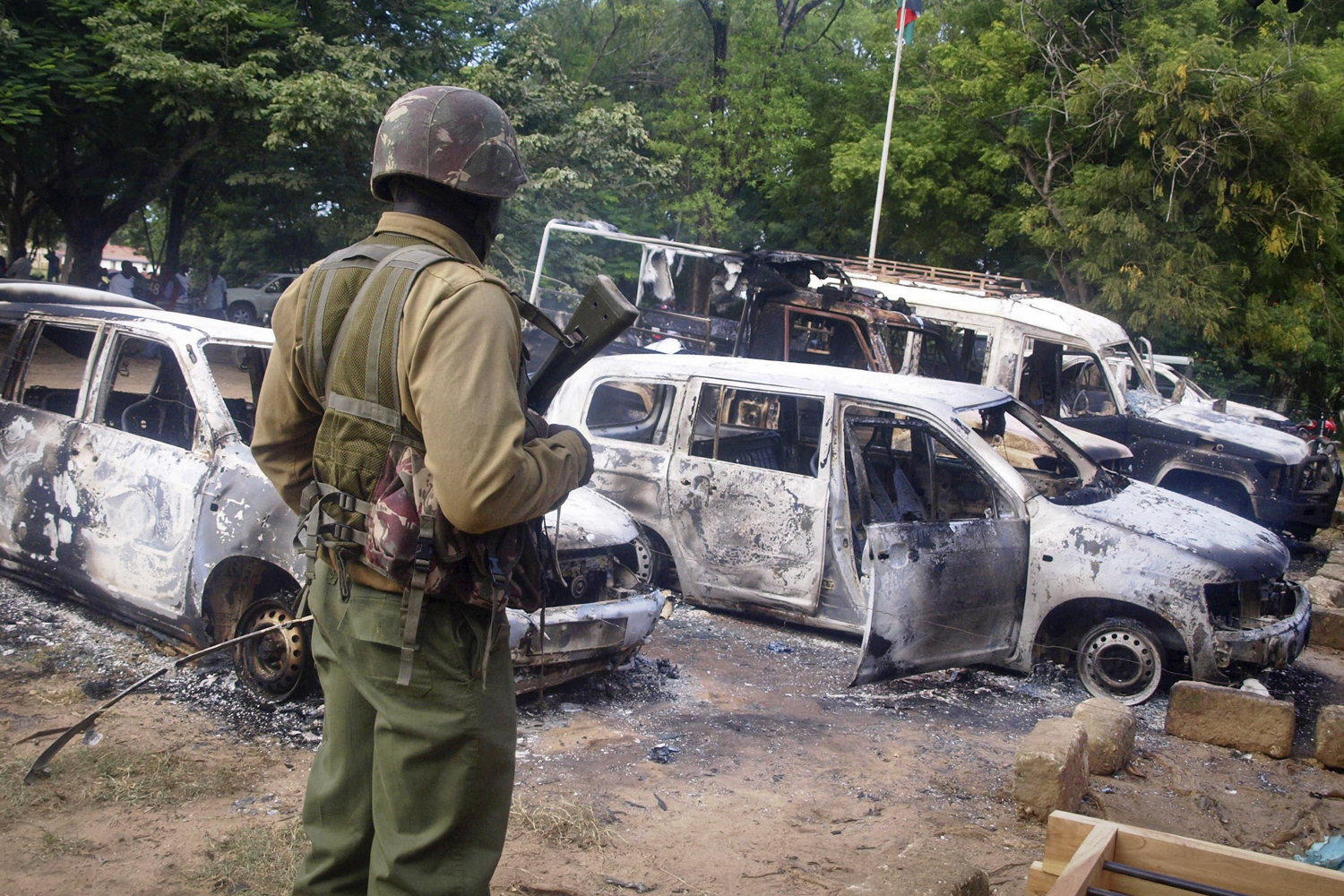
While the Kenyan government deliberates, al-Shabab has claimed responsibility for attacks on a coastal town that killed 48 people Sunday evening. Al-Shabab, a Somali militant group with links to al-Qaeda, said on Twitter on Monday afternoon that the Mpeketoni attack was “retaliation for Muslim clerics killed in Mombasa,” indicating a growing terrorism threat in Kenya as Western governments are warning their citizens to stay away.
The attack was brutal in its familiarity. In 2010 in Kampala, Uganda, al-Shabab detonated two bombs that killed 74 people watching the World Cup final. Four years later, two minibuses stormed into Mpeketoni carrying gunman who began shooting, aiming at spectators watching the World Cup. Sunday’s battle continued through the night, marking Kenya’s worst violence since al-Shabab gunmen stormed the luxurious Westgate Mall in Nairobi last year, killing 67 people.
Kenya, next door to war-torn Somalia, is being described by the U.S. government as a breeding ground for al-Shabab, an organization actively targeting U.S. citizens, buildings and businesses in Kenya — and possibly on American soil.
“The extremist presence in Kenya is very, very worrying because of the concentration of potential targets,” says Lauren Ploch Blanchard, specialist in African affairs at the Congressional Research Service, a nonpartisan think tank in Washington, D.C. She points out that Nairobi, Kenya’s capital, is home to many U.S. diplomats, aid organizations and companies, including Google and IBM. “The worst case scenario is another Westgate or worse, a 1998 embassy bombing or an attack on a Western plane, you’ve got no end of Western targets there,” she says.
Despite ramping up security, Kenya has seen a string of al-Shabab-related bombings and shootings in the past year, some connected to interchurch rivalries. Six days ago, gunmen killed Sheik Mohamed Idris, a popular moderate Muslim cleric who spoke out against the radical preachings of al-Shabab. Idris’ death followed that of a handful of high-profile preachers aligned with al-Shabab, whose deaths sparked deadly riots in the coastal town of Mombasa.
In May, the U.S. government joined the U.K. in issuing travel advisories to Kenya, warning of increased risks of a terrorist attack. On Monday, American Marines were reportedly stationed on the roof of the U.S. embassy in Nairobi.
Less than 24 hours after the attack took place, questions remain about the motive. Al-Shabab, usually the first to broadcast news of their attacks over radio or Twitter, did not take responsibility for the attack at first, prompting speculation the shooting was caused by an ethnic-based territorial dispute.
In its latest news conference, the Kenyan government did not say al-Shabab was directly to blame, referring to the attackers as an “unknown number of armed militia.” At an emergency briefing convened in Nairobi on Monday afternoon, Interior Minister Joseph Ole Lenku said armed men fled into the forest after a “fierce exchange of fire” with Kenyan security forces. “The red line has been crossed,” he said, adding the government is committed to dealing with “political incitement” and “ethnic profiling.”
Kenyans are frustrated their government is unable to identify the perpetrators and protect them from attacks. “We are so shocked and traumatized, of course we are in fear, we are scared to go into malls,” says Classin Omulo, 21-year-old student at the Kenya Polytechnic University College, in Nairobi. “You know, our President of our Republic, he was the one talking about security on the television, and the next thing in the morning we wake up to an attack,” says Omulo’s friend, 24-year-old Victor Kutswa. “It makes us think our security is not yet good.”
But the terror is unlikely to go away anytime soon, says Blanchard. “I think we were sort of all expecting some sort of attacks around the World Cup,” she said, “I don’t know if this will be the last.”
More Must-Reads from TIME
- Donald Trump Is TIME's 2024 Person of the Year
- Why We Chose Trump as Person of the Year
- Is Intermittent Fasting Good or Bad for You?
- The 100 Must-Read Books of 2024
- The 20 Best Christmas TV Episodes
- Column: If Optimism Feels Ridiculous Now, Try Hope
- The Future of Climate Action Is Trade Policy
- Merle Bombardieri Is Helping People Make the Baby Decision
Contact us at letters@time.com